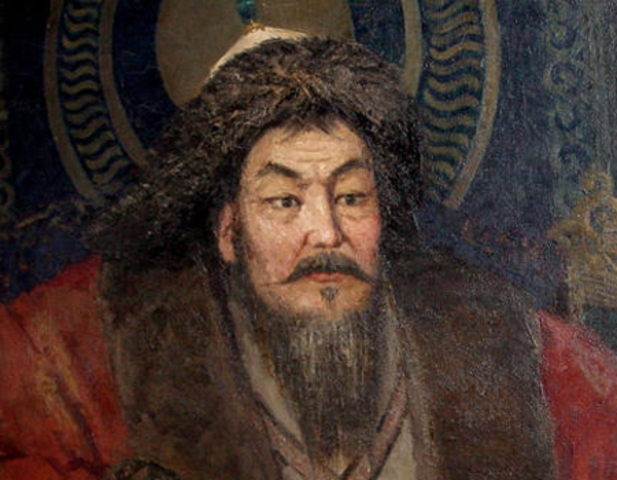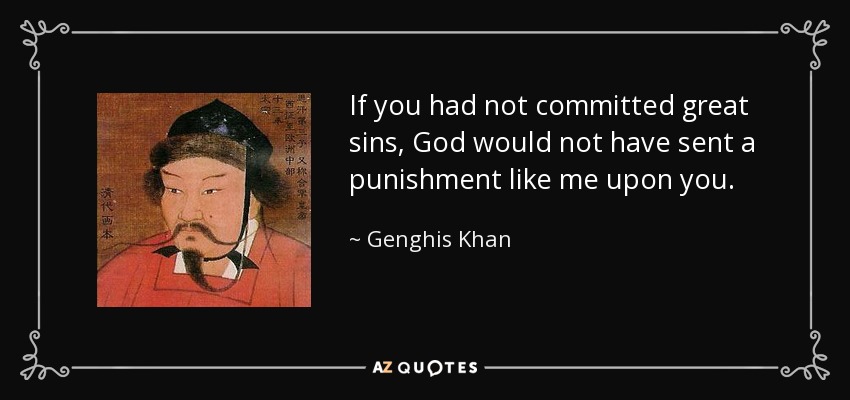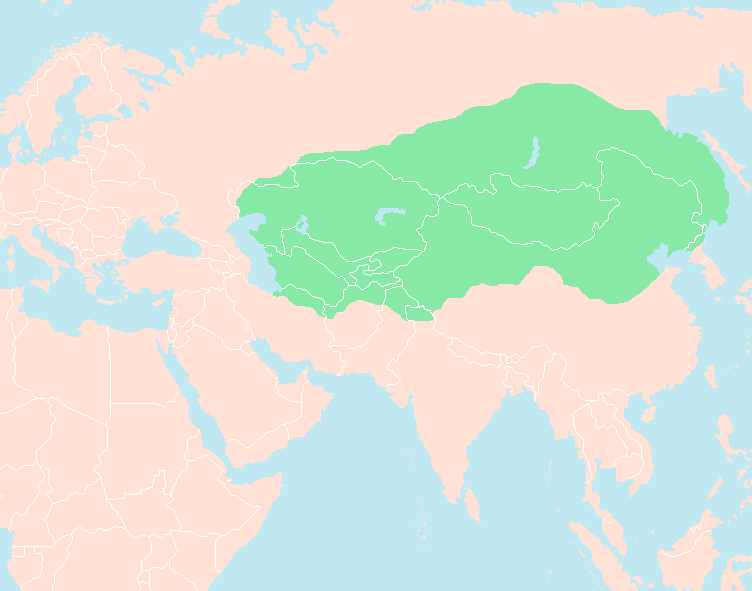Genghis Khan – a name that is synonymous with barbaric cruelty and conquest. 800 years ago he created the greatest army the world has ever known, wielding it with tactical brilliance to lay claim to the largest empire in world history. No other man, not Alexander, Napoleon or Hitler, ever came close to the level of success in conquest of the Mongolian man of steel. How did he do it? In this week’s Biographics, we discover how a simple peasant rose from one of the harshest environments on the planet to take the world by storm.
Early Days
What we know about the early life of this man who would rise to rule the world comes from an account called The Secret History of the Mongols, written soon after he died. It tells us that Genghis was born somewhere in the Steppes of Central Asia around the year 1165. It is said that he was born with a clot of blood in his hand, which was seen as a portent of great things to come.

Genghis was born into a harsh, unforgiving world. The Mongols, who lacked a common chief, were broken into a number of clans who were constantly warring with each other. The landscape was vast and rugged. Situated between Europe and China, it consisted of an inhospitable series of rolling hills, rocky outcrops and freezing temperatures. The Chinese referred to the region as the Barbarian Wilderness and built a great wall to keep its inhabitants from raiding their border regions.
For the Mongols, strength was found in numbers. Large families were encouraged, with polygamy an accepted custom custom. Ghengis’ father had two wives. The boy’s mother had been abducted from her previous husband in another tribe. As a boy, Genghis grew up with three brothers, a sister and two half brothers. His earliest years were spent in hunting, riding, and roaming the plains. As part a nomadic society, his clan were constantly on the move, seeking new pastures whenever the grazing for their sheep was exhausted.

Genghis is reported to have grown up as a brave and defiant young man – his only fear being dogs. Yet he was an introvert who preferred to spend the bulk of his time alone with his thoughts. He was fiercely independent, seeing no value in the consultation of others. As he emerged into his teens, it was apparent to all that he had a sense of his own destiny – and that destiny lay far beyond the clan that was then his world.
As was the custom, at around nine years old, Ghengis’ parents arranged a marriage for their son. His wife to be was named Birta who was from a neighboring tribe and Genghis was to be transferred to that camp so that he could grow up alongside his bride. On the return trip after delivering his son, Genghis’ father met a party of Tartars on a hunting expedition. They seemed hospitable, offering him food and drink. However, the offerings were laced with poison. Three days later he died.
First Kill
Genghis quickly returned to the fatherless family, who were abandoned by the rest of the clan. His mother, Herlein, now assumed the mantle of headship. Within the household there was constant friction between the three sons of Herlein and their two step-brothers. One day, when he was thirteen years of age, Genghis was holding a fish he had just caught when one of his step brothers came and snatched it from his hand. Without hesitation, Genghis drew his bow and killed the boy. This was the first clear demonstration of the absolute ruthlessness that would come to characterize the boy who would become the great Khan.

By the age of fifteen, Genghis was stronger, bigger and more skillful in hunting and horsemanship than his brothers, who bowed to him as their natural leader. His reputation as a strong warrior spread. Soon, the clan who deserted his family when his father had died got to hear of this upstart. Fearing that he might lead his brothers against them, they decided to take the initiative by invading the family’s encampment and taking Genghis captive. But Genghis was able to escape. The invaders fanned out into the wilderness and, nine days later, they found him. Genghis was taken prisoner and a heavy wooden yoke was placed around his neck.
A couple of days later, while Genghis was languishing inside a guarded tent with the yoke still around his neck, his captors threw a celebratory party. Despite the inconvenience of the yoke, Genghis managed to overpower his guard. He got down to the river before his absence was discovered. Unable to traverse the river while wearing the yoke, he then returned to the tent from which he had come. There he found the guard who he had recently overpowered. Genghis then displayed the shrewdness of thinking which was to set him apart – he told the guard that unless he got him out of the yoke and gave him a horse, he would tell the others that the guard had helped him escape. The blackmail worked and he was soon galloping away from his captors.
Forging Alliances
A year later, at age 16, Genghis returned to the village of Birta, the girl he had been pledged to at the time of his father’s death. It was time to get married. As a wedding gift, the girl’s father gave him a spectacular sable coat. The next day, Genghis took his wife back to his encampment and left her in the care of his mother. He then rode off to a neighboring clan, where he presented his new coat as a gift to a chieftain by the name of Toghrul. In doing so, Genghis was purchasing the allegiance of this powerful clan leader. He asked Toghrul to help him to win back the loyalty of the tribesmen who deserted his family after his father’s death. Toghrul was sympathetic and a pact was formed between them.

News of the alliance soon spread. Other clans offered their support and before long, Genghis was able to call upon a formidable force of warriors. Before he could put them to action, however, disaster struck. Invading Merket horsemen came thundering across the plains, intent on kidnapping the women of Genghis’ camp. The majority of the clan managed to escape, but Genghis’ young wife, Birta, was taken captive by the Merkets.
Genghis desperately rode for the camp of Toghrul for help. Toghrul announced that he would ride upon the Merkets and destroy them, returning Birta to her husband. Over the next few months, the alliance managed to bring together more than 5000 warriors from surrounding clans to ride with them.
The attack was swift and decisive. The Mongol hordes decimated the Merket camp, killing, looting and pillaging without mercy. In the midst of the camp they found Birta. She had been raped repeatedly and was pregnant. Shortly after returning to camp, she gave birth to a son. It was never known if the father was Genghis or one of her Merket rapists.
Absolute Power
In the wake of the overthrow of the Merkets, Genghis went from strength to strength. He united with the clan of his boyhood friend, Jamuka. The two men became inseparable, declaring themselves blood brothers. They lived together, ate together and slept together. This roused the jealousy of Genghis’s wife and mother, who began to spread rumors about Jamuka in an attempt to drive the two men apart.

Whether it was the influence of the women in his life or his own lust for absolute power, something caused Genghis to sever the bond with Jamuka. In 1185, the two clans were moving to more fertile grazing ground when Jamuka decided turn off and camp in a valley. He called to Genghis to join him, but Genghis ignored him and kept on riding. Carrying on a mile or so he turned in his saddle to see that, not only his own clansmen, but many from Jamuka’s clan had followed him.
Genghis was now developing the largest following of any of the Mongol clans. This was achieved partly through the desire for security in numbers and partly by coercion. Those who did not agree to give Genghis their allegiance were forced to do so. The combination of his desire for power and wealth and his need to feed his ever expanding following led to repeated raids on other clans, the capture of their women and the plundering of their belongings. The Secret History of the Mongols attributes a quote to Genghis which may be familiar to fans of the 1982 movie Conan the Barbarian, in which the words were given to Arnold Schwarzenegger‘s character . . .
“The greatest pleasure is to vanquish your enemies and chase them before you, to rob them of their wealth and see those dear to them bathed in tears, to ride their horses and clasp to your bosom their wives and daughters.”
Still in his early twenties, Genghis proved himself to be brilliant at psychological warfare. He would attack a tribe with horrific, devastating force in order to intimidate the surrounding camps to give up without a fight. As a result, many thousands of his enemies simply surrendered in order to avoid the carnage that would result if they resisted.

Having subjugated and melded into one the disparate Mongol clans, Genghis now set his sights on the furthest reaches of the Barbarian wilderness. Among those who had not yet joined his alliance was his former best friend Jamuka, now his mortal enemy. The people of the two camps had been able to maintain an uneasy peace. However, one day a disagreement over grazing lands erupted into violence, with one of Genghis’ men killing a warrior from Jamuka’s camp. An outraged Jamuka reacted by attacking the much larger camp of Genghis. The unexpectedness and lightning speed of the raid results in the killing of many and the capture of 70 of Genghis’ chieftains who were taken back to Jamuka’s camp where they were tortured and boiled alive.
Genghis was shocked to the core at this humiliating defeat. He came to the realization that his army was not yet ready to engage in the large scale conquests that he envisioned. Consequently he set out to mold them into a war machine; a breed of warrior the likes of which the world had never before seen.
The army that resulted was incredibly mobile, able to travel an average of 70 miles per day. The men were subjected to the most severe discipline in order to forge their minds and bodies into warrior-like steel. Before long the reputation of the barbarian super army spread beyond the boundaries of Mongolia. When the rulers of the Chin Empire in China heard about them, they invited Genghis to come and help them to fight off marauding bands, the Tartars, who were constantly harassing them.

The Tartars were also long time enemies of the Mongols, and Genghis saw this as an opportunity to exact vengeance while expanding his reach internationally. In short order the overpowering force of the Mongols crushed the Tartars. Returning in triumph to their home country, Genghis’ army was immediately attacked by Jamuka’s forces. This time, however, Genghis was ready. Over a series of three bloody encounters, Jamuka’s followers were finally subjugated. Jamuka, however, managed to escape, fleeing to the sanctity of the Naimans, a powerful tribe dwelling in the north westerly region of the Steppes.
When news reaches Genghis that Jamuka had joined the Naiman, he sets his sights on destroying them. He unleashed his 80,000 strong cavalry against them, totally overpowering them in a frenzy of blood-letting. Amazingly, however, Jamuka, managed to escape. He hid with a small clan of mountain dwellers, but they, fearing the wrath of the invaders , betrayed Jamuka and handed him over to the camp of Genghis.
Genghis was shocked at the lack of loyalty of these people to Jamuka and had them all slaughtered. Then, he extended mercy to Jamuka with an offer of pardon. But Jamuka refused and begged to be put to death. Acceding to this wish, Genghis allowed his old friend to be suffocated to death inside a carpet. Despite his reputation as an unfeeling executioner, Genghis turned away, unable to watch the scene.
The Great Khan
Having defeated the Naimans, Genghis was now the supreme ruler of in excess of two million people. Having had a taste of supreme power, he now wanted more. There were still parts of Mongolia that were not part of his empire, those along the eastern and southern regions of the land. Over a period of months he systematically beat into submission those who had not yet come under his yoke.

Genghis rode at the very front of his ferocious hordes, personally overseeing every detail of the attack. But his greatest skill lay in his ability to hand pick brilliant generals. In doing so, he managed to unite a people who had for centuries been at war with one another. In 1206, the people made Genghis their supreme ruler, bestowing upon him the title of Khan – the great leader. As recorded in the Secret History of the Mongols the people proclaimed . . .
We will make you our leader, our great Khan. We will fling ourselves like lightning upon your foes. We shall give you the fairest girls from the enemy. If we disobey you, take our flocks and our wives and our children and throw our worthless heads upon the sand.
Between military conquests, Genghis enjoyed the rewards of success. He gathered more wives and fathered more children. By his first wife, Birta, he had four sons, who would each be given rulership over a part of his empire.
!["I hate luxury. I exercise moderation…It will be easy to forget your vision and purpose once you have fine clothes, fast horses and beautiful women. [in which case], you will be no better than a slave, and you will surely lose everything." Genghis Kahn](http://www.azquotes.com/picture-quotes/quote-i-hate-luxury-i-exercise-moderation-it-will-be-easy-to-forget-your-vision-and-purpose-genghis-khan-73-80-70.jpg)
Conquest Abroad
In 1206 Genghis called together a great summit of his generals and tribal leaders to discuss his planned invasion of China. Between Mongolia and China, lay the Kingdom of Hsia, the land of the Tanguts. This was a key trade route between central Asia and the West. Genghis undertook a campaign of conquest that, within two years, brought the entire Kingdom of Hsia under his domain. The way was now open to invade China.

In an effort to capitalize on his previous dealings with the Chin Empire, Khan sends a peace envoy over the wall. Chin authorities, however, were suspicious of the visitors and put them to death. On hearing of this outcome, Genghis took to his tent and fasted for three days. He emerged to declare that the heavens had pronounced victory upon him. The time was at hand for his army to wreak vengeance upon the Chin.
With 40,000 cavalrymen riding behind him, Genghis crossed the border, smashing over the wall and into China. They then swept down upon the Chin Empire. They approached with unrivaled speed and quiet until almost upon the enemy, when the thundering of their horses hooves shook the ground. The attacks that followed were overwhelming, crushing their enemies and destroying their encampments.
It was during the Chin Campaign that the ruthlessness of Genghis Khan became legendary. He would use captured women and children as human shields in battle, forcing them to march ahead of his army as they approached an enemy village.
Within two years of first invading China, Genghis had reached the capital of the Chin Empire, Jon-Do (modern day Beijing). The great city was encircled by a wall and strongly fortified. Kahn’s army laid siege for almost a year. Finally, with the aid of siege towers and catapults, the Mongols managed to breach the wall. After a fierce battle and at the cost of thousands of Chinese lives, the city fell.
After subjugating the Chin Empire, Genghis rode back to the Steppe country of his birth. But it wasn’t long before the spirit of conquest once more fired his ambition. He now looked to the world beyond China – the fringe of Europe.
Between China and Europe lay the vast Islamic empire known as Quarasan. It was ruled over by a Shah, who had power that equalled that of Genghis himself. But Khan did not wish to subjugate the lands of the Shah. He sought only peace, sending a caravan of envoys to Quarasan. Yet just after they crossed the border, all of his men were captured and slaughtered.

An enraged Genghis sent another group of envoys, this time instructing them to go directly to the Shah. They too were murdered by Islamic soldiers. For Genghis who believed in the absolute inviolability of envoys, this was too much. The time for vengeance was at hand. He set out at the head of his largest army to date, more than 200,000 men.
Years of savage butchery were unleashed upon the Muslim people. By the time the bloodletting subsided, Genghis Khan had wrested absolute power away from the Shah. His vast empire now spans from the Yellow Sea in the east all the way to Caspian in the west.
The End
Before returning to the Steppes, Genghis appointed his son Ugaday as his heir. He now faced the problem of controlling his vast empire. In the summer of 1226 he rode at the head of 180,000 warriors to crush an uprising among the Tangut people. Before he got to them, however, he fell from his horse and suffered serious injuries and internal bleeding. Over the coming months he only got worse. On August 18th, 1226, aged 62, and at the height of his power, he died.

Genghis Khan’s legacy would be cemented by his grandson Kublai Khan who extended the Mongolian Empire to encompass two continents and become the largest empire in history. Perhaps Khan’s most enduring contribution, however, was that, though forged through unspeakable violence, his conquests brought about a peace and stability that enabled the first ever flow of trade and ideas between the Eastern and Western worlds.



